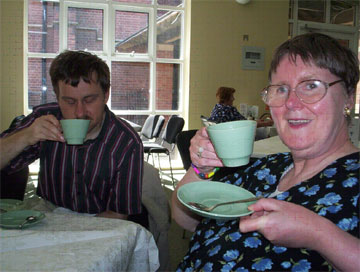You are here
- Home
- Conferences
- Conference 2008
- Keynote speech - Time and money
Keynote speech - Time and money
Changing configurations in learning disability day services
Helen Graham
How much time you have to spare and how much money you have to spend define who you are in our society. Both time and money together affect where we spend our days and where we live as well as things like how we dress and what we eat for dinner.
In this presentation I'd like to use the relationship between 'time' and 'money' to help us think about learning disability day services and how they have changed since the 1960s. I will use learning disability services in the London Borough of Croydon as a focus for this discussion.
I will explore these questions:
How was time structured in Adult Training Centres in the 1960s, 1970s and 1980s?
- What was the daily routine?
- How did this routine reflect staff and professional views of the 'mental handicap trainee'?
What role did money play in the operation of Adult Training Centres?
- What happened to the money paid to the Centres for contract industrial work/assembly and packing?
- How much did people with learning disabilities get paid and what did they think about this?
- What do people remember about subsidised holidays and days out?
How has the relationship between time and money in day services changed over the past 10 years?
- How do people spend their time today? What is paid for and what do people have to pay for themselves?
- What does this say about the different ways in which people with learning disabilities are currently being thought about in policy and professional practice?

I will conclude by considering the meaning of these changes for the future - do these histories point to potential dangers as well as benefits?
- Is there a conflict between 'independence' and 'choice' and ensuring access to public money for learning disabled people?
- How do the new ways of spending time and spending money sit within a larger picture of New Labour social policy and within a society still defined by logics of meritocracy and the experience of differentiation (by ability, by wealth)?
Contact us
About the Group
If you woud like to get in touch with the Social History of Learning Disability (SHLD) Research Group, please contact:
Liz Tilley
Chair of the Social History of Learning Disability (SHLD) Research Group
School of Health, Wellbeing and Social Care
Faculty of Wellbeing, Education and Language Studies
The Open University
Walton Hall
Milton Keynes
MK7 6AA
About the website
If you have any feedback or would like to report a problem with the website, please contact WELS-Research-Admin@open.ac.uk.